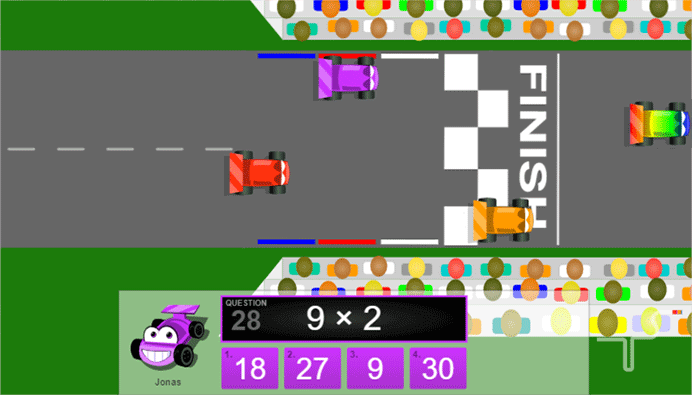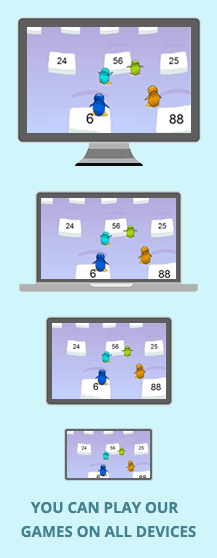Can Games Really Help Kids Get Better at Math?
By Megan - 11/05/2022
When you ask kids to sit down to do a math worksheet, you might hear sighs and excuses from the little ones. For some kids, math can be a difficult to learn for the first time. Other kids can get anxious about doing math equations or might find it boring to sit still for so long and work out calculations. But there’s one way to make math fun: Games!
Whether you are a teacher or parent, you may have heard about math games and wondered if they were really effective in helping kids build and retain knowledge. If you are on the fence about incorporating games into your curriculum, keep reading this article to learn the truth about multiplication games!
What are the most common types of math games?
A typical math game will have a theme that determines the animations, graphics and characters. There will be a clear set of rules that give kids a challenge to complete, usually something unrelated to math itself. The game encourages kids to solve math equations correctly to progress and win the round.
There are a variety of different math games for varying skill sets, usually including the basics like addition, subtraction, division and multiplication. A major plus of math games is that they teach kids skills like problem-solving, strategy, focus, concentration and competition while raising awareness about a unique theme or goal of the game, for example, cleaning up the ocean!
The benefits of math games for kids
There are so many benefits to math games that might go unnoticed by hesitant teachers and parents. Although it’s always recommended that you regulate your child’s screen time, math games can be an amazing, productive replacement for traditional games. In fact, they can even work as a reward system for doing their homework or getting a difficult question correct. Here are some more benefits of math games for kids!
There is a clear objective.
If you are trying to teach young ones about math, they probably have a short attention span and want to be entertained. Math games provide a clear objective that is simple for children to follow and often distracts them from the fact that they are doing math. Children will learn exactly what to do and build confidence as their playing skills improve.
There is an element of challenge and competition.
 Most math games for kids will have different levels that gradually increase the difficulty. Additionally, kids can play alone, with friends in a group or against other competitors. The element of competition helps children challenge themselves while learning how to win and lose, or work as a team. Our Multiplication Race game is an excellent example of a competitive game. In this game, the player must race against other students from all around the world while practicing the multiplication table.
Most math games for kids will have different levels that gradually increase the difficulty. Additionally, kids can play alone, with friends in a group or against other competitors. The element of competition helps children challenge themselves while learning how to win and lose, or work as a team. Our Multiplication Race game is an excellent example of a competitive game. In this game, the player must race against other students from all around the world while practicing the multiplication table.
The environment is less stressful for learning new things.
There are a lot of kids today who can get questions right, but they may get anxious when taking tests, doing homework, or answering questions on the spot in class. Math games reduce the level of stress, allowing kids to form a genuine understanding of how to successfully complete an equation. This can be highly beneficial for kids who struggle with math or learn best in untraditional ways.
Games encourage repetition.
Since there is a winning element to math games, kids are encouraged to keep playing again and again until they win or reach the next level. Traditional worksheets don’t have the same appeal as spending 20 minutes in a digital world. The more kids are naturally inclined to play, the higher the likelihood that they will troubleshoot their weaknesses, find solutions, and keep practicing!
It’s a great way to review and practice new skills.
Math games are not a replacement for learning new skills, but they can be perfect for reviewing and practicing something they were taught in class. Switching up the scenery for young kids can help boost memory retention and create positive associations with math.
Games creates a positive experience for kids.
It’s not uncommon for kids, or people, of all ages to shake their heads at the thought of math. It’s true, not everyone is naturally skilled with numbers, but that doesn’t mean they need to grow up disliking something that is so essential in our daily lives. Math games bring an element of fun that isn’t traditionally involved in math. This can help kids grow up and value the subject on a deeper level. It also opens their minds to learning and understanding new skills.
Math games can be highly effective for children
Math games teach kids more than just math. They also learn how to problem-solve in a low-risk environment, work effectively in competitive situations, and stay calm under stress. People of all ages can gain value from learning these fundamental skills, especially little ones.
If you have a child who is struggling to learn, retain and understand basic math equations, consider introducing math games as a secondary practice resource. They will be more likely to pay attention, get involved, and learn skills so they can advance to the next level and win the game. Moreover, everything is set up in a positive, engaging environment that kids genuinely enjoy!
If you are interested in free online multiplication games for kids, explore the many options on our website today!






